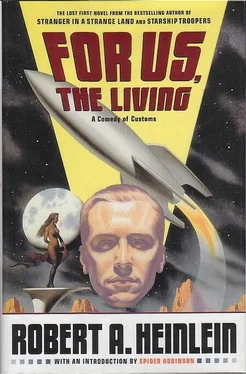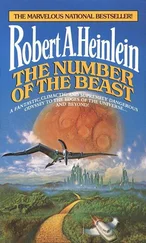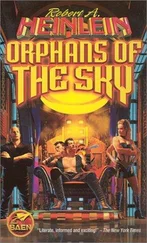Robert Heinlein - For Us, The Living
Здесь есть возможность читать онлайн «Robert Heinlein - For Us, The Living» весь текст электронной книги совершенно бесплатно (целиком полную версию без сокращений). В некоторых случаях можно слушать аудио, скачать через торрент в формате fb2 и присутствует краткое содержание. Жанр: Фантастика и фэнтези, на английском языке. Описание произведения, (предисловие) а так же отзывы посетителей доступны на портале библиотеки ЛибКат.
- Название:For Us, The Living
- Автор:
- Жанр:
- Год:неизвестен
- ISBN:нет данных
- Рейтинг книги:3 / 5. Голосов: 1
-
Избранное:Добавить в избранное
- Отзывы:
-
Ваша оценка:
- 60
- 1
- 2
- 3
- 4
- 5
For Us, The Living: краткое содержание, описание и аннотация
Предлагаем к чтению аннотацию, описание, краткое содержание или предисловие (зависит от того, что написал сам автор книги «For Us, The Living»). Если вы не нашли необходимую информацию о книге — напишите в комментариях, мы постараемся отыскать её.
For Us, The Living — читать онлайн бесплатно полную книгу (весь текст) целиком
Ниже представлен текст книги, разбитый по страницам. Система сохранения места последней прочитанной страницы, позволяет с удобством читать онлайн бесплатно книгу «For Us, The Living», без необходимости каждый раз заново искать на чём Вы остановились. Поставьте закладку, и сможете в любой момент перейти на страницу, на которой закончили чтение.
Интервал:
Закладка:
One felt a leg and said, "It is like the trunk of a tree."
One had grasped the tail and answered, "How ridiculous! It is a rope."
A third countered, "You are slightly mistaken, brother. It is somewhat like a rope, but is actually a mighty snake." He had touched the trunk.
Another ran his hand across the broad solid side of the beast and exclaimed, "How can you be so deceived? Verily, it is a wall."
The last touched the elephant not at all, but heard him trumpet. He fled, for he thought the Spirit of Death was upon him.
They were all correct insofar as their data went. Each in grasping a part of the truth had reached a different wrong conclusion.
Twentieth century economists, of whatever school, almost unanimously fell into the same sort of error. Illustrations of how they made such errors, through examining some special case of the production-consumption cycle, are set forth below:
RENT TROUBLE (The Single Tax Argument)
Use the same data as used by Perry and Davis, except:
(1) the banker spends all of his interest.
(2) the land owner does not spend his rent.
OVER-PRODUCTION: two playing cards.
Nevertheless, title to land frequently results in individuals receiving returns in rent disproportionate to investment. This is Henry George's "un-earned increment." But un-earned increment does not in itself cause over-production, and taxing it away will not balance the cycle. On the contrary, it throws it further out of balance. Taxing un-earned increment out of existence is only a means of social readjustment.
PROFIT TROUBLE (The Socialist Argument)
Same data except:
(1) Banker spends his interest.
(2) Entrepreneur spends only two shekels.
OVER-PRODUCTION: 3 playing cards.
Same situation as above. If a concern's profits seem disproportionately high, they may be lowered by punitive taxation, but to do so will not tend to balance the cycle, unless shekel for shekel (or dollar for dollar) an equal amount of money is given away to someone who will spend it.
LABOR TROUBLE (The Conservative Argument)
Using the same data, but with banker spending all the interest, run two cycles side by side. Let the additional cycle suffer from labor trouble, the workers striking for high wages, and winning the strike. Let the additional labor cost be 31.5 shekels. Necessary price of cards will be 2.5 shekels per card in this cycle. But the other cycle can sell to the same market at 2 shekels per card. No matter what the final market price, both cycles will have overproduction, or the second cycle will fail to obtain a return equal to cost, or both.
Results:
(a) Market price 2 shekels, 1st cycle balances, 2nd cycle sells all its goods, but is insolvent by 31.5 shekels.
(b) Market price 2 1/2 shekels, combined over-production is 15.75 playing cards.
DUMPING FROM ABROAD (The High Tariff Argument)
Using the same data, place on the market from another cycle with lower costs of any sort, especially labor, playing cards to sell at one shekel. Our entrepreneur is forced to cut prices and goes broke. Orthodox solution, XXth century: protective tariff. Rational solution: Cease to manufacture the type of articles being dumped on us, and pay for them with our currency. We gain the increment in real wealth.
INTEREST (The Anti-Semitic Argument)
There is an element of truth to this argument—that interest not spent as purchasing power unbalances the cycle. The illustration given in the narrative is proof of this. And there were undoubtedly many Jews in the banking business, though by no means a majority. Yet somehow on this slender pedestal, an incredible structure of half-truths and outright falsehoods was constructed many times in history to 'prove' that Jewry was engaged in a conspiracy to enslave the rest of mankind. It is difficult for us, in the enlightened 21st century, to realize that this preposterous myth was the cause of torture, mass murder, and an endless number of vicious acts of racial discrimination.
MONOPOLY (The Trust-Buster's Argument)
This problem should be set up in three ways, monopoly of raw materials, monopoly of technique, and monopoly of a field of enterprise. In each case modify the data to cause the holder of the monopoly to (a) receive too large returns (b) freeze out a competitor.
Monopoly of raw materials is contrary to public interest. The state must exercise its right of control or expropriation to prevent it.
Monopoly of technique is now limited to the royalty rights of the inventor, but in former times the owner of a technique was legally able to monopolize it entirely, even to the extent of neither using it, nor allowing others to use it.
Monopoly of a field of enterprise, where it is not based on the other types of monopoly, usually indicates greater efficiency and should be controlled in the public interest rather than eliminated. We now believe that the interest of the consuming public is paramount. It was formerly held that the interests of the little businessman were paramount. This point of view is roughly equivalent to that of the machine breakers at the beginning of the industrial revolution in the 19th century.
It is obvious that natural causes alone are sufficient to destroy a big business which serves the public less efficiently than a small business, all other things being equal.
The above illustrations, while by no means exhaustive, show the type of error into which our forefathers fell. In each case, the proponents of the above-listed arguments took a special case of the production-consumption equation and treated it as if it were the general case. In each case they were right—as far as they went—but by assuming their special case to be the general case, their conclusions were invariably fallacious.
For comparison with 20th century economies the problem set up by Perry and Davis will now be worked as an illustration of the general case of the production-consumption cycle, applying the modern method of the dividend-discount for balancing the cycle.
Total cost of product: 126 shekels
Number of units (playing cards): 63 shekels
Assume that holders of purchasing power refrain from spending 26 shekels. Therefore, if the government issues a total of 13 shekels as a dividend, and authorizes a discount of 13.126 or approximately 10%, the spread between production and consumption will be eliminated. Capitalization of the country will be increased by 26 shekels and production will be greater in the next fiscal period, thereby increasing the real wealth of the country.
This problem must be worked out with the chessmen, or their equivalent, to be appreciated. This type of problem is worked out in more detail on page 171.
The invention of the discount method of preventing inflation is usually attributed to C.E. Douglas, a Scottish economist of the early 20th century.
AFTERWARD
"A Clean Sweep."
Fifty years before Robert Heinlein's death in 1988, he wrote For Us, The Living, his first novel.
Like many writers, Heinlein found himself repeatedly answering the same questions. In particular, "How did you get published?" His polished tale went like this: He had lost a political campaign in 1938, and faced a mortgage and no prospects of employment. He saw a contest in Thrilling Wonder Stories offering $50 for science fiction stories from unpublished authors and decided he would give it a try. In four days of April 1939, he wrote his first story, "Life-Line"—and decided it was good enough to submit to the top market of the day, John W. Campbell's Astounding Science Fiction. Campbell bought it, and Heinlein never went back to what he called "honest work."
But as James Gifford has pointed out in Robert A. Heinlein: A Reader's Companion (Nitrosyncretic Press, 2000), the story is not quite that simple. There was indeed a writing contest, but in the October 1938 Thrilling Wonder Stories. However, there was no $50 prize; instead, it was a call for submissions, at the normal word rates. Future great science fiction writer Alfred Bester won that contest and had his first story printed in the April 1939 issue, when Heinlein was just starting "Life-Line"—which shows another flaw in the polished myth: the contest was already publicly won before Heinlein even began his intended submission.
Читать дальшеИнтервал:
Закладка:
Похожие книги на «For Us, The Living»
Представляем Вашему вниманию похожие книги на «For Us, The Living» списком для выбора. Мы отобрали схожую по названию и смыслу литературу в надежде предоставить читателям больше вариантов отыскать новые, интересные, ещё непрочитанные произведения.
Обсуждение, отзывы о книге «For Us, The Living» и просто собственные мнения читателей. Оставьте ваши комментарии, напишите, что Вы думаете о произведении, его смысле или главных героях. Укажите что конкретно понравилось, а что нет, и почему Вы так считаете.












